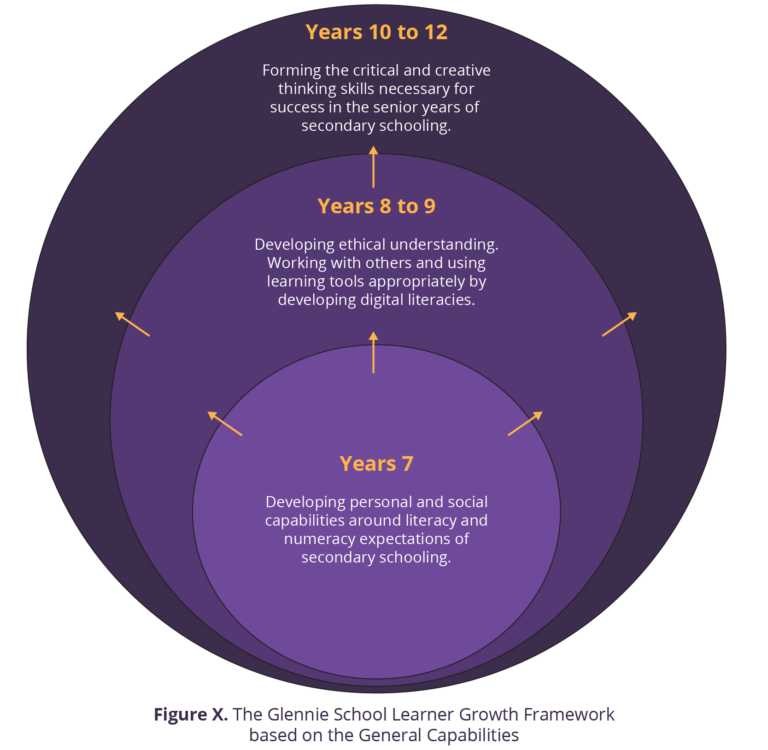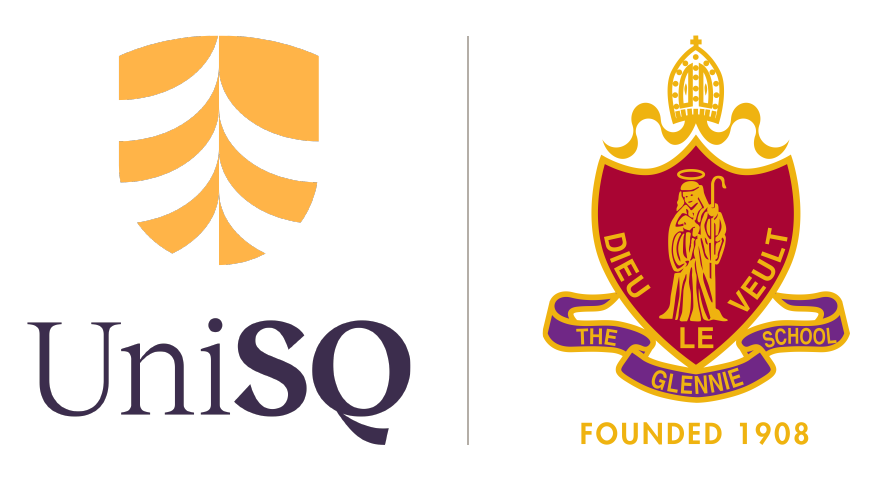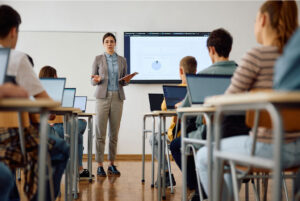Teaching for Academic Integrity
By fostering the development of confident and capable learners, we can make academic integrity an intrinsic part of our school culture. Below, we explore some strategies to support the General Capabilities (ACARA, 2023), recognising the educative potential of technology while also promoting its ethical use. Taking this approach embeds academic integrity as standard practice rather than an afterthought or a roadblock to be subverted.
There are also links to further information about common threats or pressures that can limit the students’ ability to develop the General Capabilities, with suggestions for overcoming these challenges. This can also be found in the Overcoming Challenges menu. The Glennie School has developed a model that centres on building a culture of academic integrity using the General Capabilities as a framework for staged development.

The intelligence of Large Language Models such as ChatGPT is Artificial, while the young people in our care are at their most human during their teenage years. Thus, academic learning is most effective when it works in partnership with wellbeing programs to support the holistic development of the student. Some strategies to support students’ personal and social capabilities include:
developing an age appropriate school-wide gradual release responsibility for use of technology (e.g delaying the setting of digital assessment until later in Year 7, not requiring students to take laptops home in lower year levels).
portfolios of work
group/collaborative projects – including the explicit teaching of collaboration skills
use of routines that model the thinking and processes required for the activity, for example Harvard’s Cultures of Thinking model
reflect on their development of skills for learning
By fostering students’ personal and social capabilities, we can counter performance culture, stress and pressure and poor time management as factors that may contribute to a student engaging in academic misconduct.
By focusing on feedback rather than correction, teachers can assist students to develop their own skills as editors. It is all too easy to ‘accept track changes’ when editing without really understanding why the correction was needed. However, by focusing on feedback that explains the problem and gives one example of how it can be corrected, teachers can support students to develop their literacy and numeracy skills. Some strategies include:
explicit instruction on literacy and numeracy
teaching self-editing without an over reliance on technology
practicing peer-editing to develop ability to recognise and correct mistakes, and making editing ‘detective work’
doing low-stakes or formative assessment of students’ literacy and numeracy e.g. weekly grammar and spelling quizzes, dating and chronology activities, maths problem solving activities, 10 quick questions on […], etc.
when providing feedback, point out common errors and provide support for students to develop their own understanding and editorial capability – don’t correct it for them.
teaching and modelling examples of quality responses for assessment
teacher feedback to understand errors and improve, eg reading resilience strategies – ie here’s an example or explainer: find the errors and correct it yourself
ensuring there is suitable support for culturally and linguistically diverse students who may encounter additional barriers to learning.
While it is easy to assume that students have a high degree of digital literacy, this is not the case. Students often do not understand the ramifications of their digital activities (e.g. posting inappropriate or bullying content on social media; using ‘study support’ websites, copying and pasting text without acknowledgement). Blanket bans are generally ineffective, as students use VPNs, mobile hotspots and other strategies to circumvent school firewalls, or just access material at home on other devices. Schools can support the development of digital literacy through:
modelling ethical and strategic use of appropriate tools
giving explicit instruction about how to use tools needed for learning
giving students opportunities to practice making appropriate choices about technology
communicating with parents to ensure expectations around technology use is shared
provide opportunities for students to develop proficiency in the ethical use of GAI tools with teachers’ support and supervision
Having available opportunities to misuse technology is one key reason students will engage in misconduct, so fostering digital literacy is a key means of countering this challenge, particularly when designing assessment.
Simply telling students to use tools in a particular way may not change their behaviour. Explaining the ethical considerations and potential harms of using tools inappropriately, and aligning these conversations with school and community values can help students understand why certain conduct should be avoided. This is a whole school community approach. The following are recommended:
-
educate parents and carers about the need for digital literacy, its ethical use and how they can support their learner and the school in this process
-
have clear guidelines
-
in developing student’s digital literacy, foreground the need to act ethically at all times
-
align with school values
-
make clear the consequences for unethical conduct.
We foster a shared understanding of ethical use. One example is the video below, which shows 3 different levels of GenAI use: spelling and grammar checks, phrasing changes and rewriting. Talking through which of these students see as suitable or not, and sharing where the School policy suggests ‘the line’ lies is an easy way to model appropriate use and communicate shared expectations clearly. By modelling appropriate use and making clear the consequences of misuse, students are less likely to engage in misconduct.
When the world’s collective knowledge is available on Wikipedia, and GenAI can write an essay or produce a video in minutes, the human skills of critical and creative thinking have never been more important. A school culture that values effort and originality over performance and outcomes will foster learners who are engaged and want to contribute their ideas.
Provide students a range of opportunities to rehearse and develop their critical and creative thinking through:
-
focusing on the curriculum/syllabus cognitions
-
using thinking routines to promote the process of thinking
-
making critical and creative thinking visible in teaching and learning
-
giving students the opportunity being actively engaged in critical and creative thinking, with opportunities to revisit and iterate their thinking.
-
developing a culture of learning that celebrates effort and originality over a culture of performance and outcomes.
Having engaging learning experiences for students reduces the risks of them looking elsewhere for support due to poor instructional quality.





